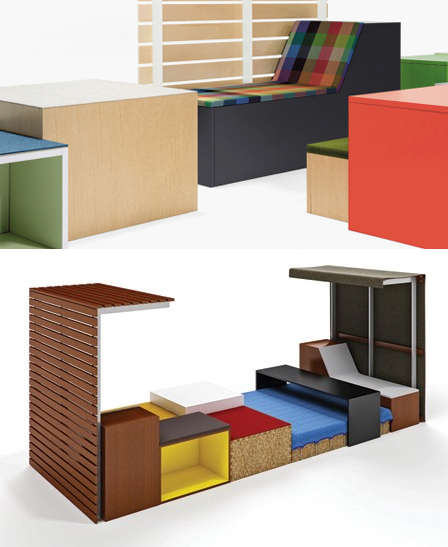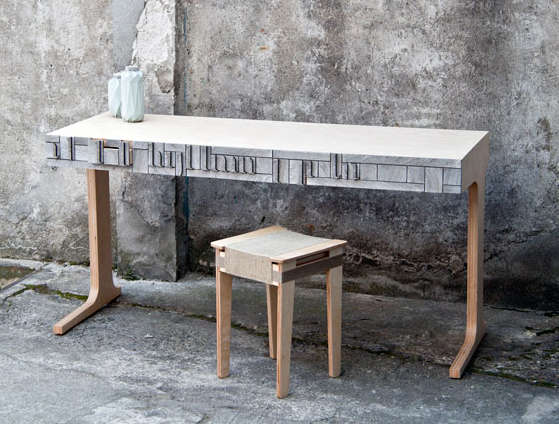There are numerous approaches to green furnishings design: some reimagine ways of repurposing products to extend their useful lives, others seek to fashion eco-friendly goods with a distinct aesthetic, while a few boldly forge ahead to create sustainable raw materials to implement their own vision. These 9 unique solutions are all pursuing the same quest: to come up with eco-conscious furnishings that are not only amazingly innovative but also deliciously eye-popping. Let me know which one you love most!

Air is a grand experiment on Chinese bamboo weaving techniques where strips of bamboo are loosely woven to form the shell of the chair. Pinwu pushed the boundaries of bamboo’s physical properties to produce a durable yet extremely lightweight chair. Being handmade, no two chairs are alike!

The Flake Blind is inspired by the ethereal snow flake. Though these flakes look delicate, they’re actually made of Tyvek, a tough, flashspun hi-density polyethylene. It’s also biodegradable and dust-resistant, which is a boon for anyone with dust allergies, given the blind’s structure!

Consisting of 3 simple parts: shade panels, a bamboo frame and cord set, the Moso Pendant can be assembled without use of tools or fasteners. By finishing the wood in low VOC linseed & tungsten oils and updating the light fixture using shoji paper in lieu of styrene as the shade liner, Brian Schmitt continues to strive for maximum sustainability in his work.

Designer Michelle Baggerman accomplished a major feat by developing a way to upcycle disposable plastic bags into another application and extend their useful lives. Realizing that a recycled product is often of lower quality, but consumes a lot of energy and releases toxic materials during production, Michelle decided to repurpose the plastic bags without using chemical or thermal processes. Employing nothing more than a drop spindle and spinning wheel, plus lots of elbow grease, she transformed the lowly plastic bags into beautiful skeins of yarn. The resulting woven textiles are durable but at the end of life, can be easily recycled as plastics.

The mix-and-match furniture from First Office offers a relaxed environment that is flexible enough for group tasks or focused work. Taking its cue from pallet crates, the modular furniture with it hip slatted canopy is the embodiment of simplicity and sustainability. Sporting a formaldehyde-free Euroluxe finish, the humble Oriented Strand Board (OSB) is showcased with dovetail joints under a clear topcoat. Reinforcing the mobility theme, simple quilting & felt pad cushions are witty takes on the moving blanket.

The KC-97 Stratotanker was a widely used aerial tanker for refueling B-47 Stratojets during the 1950’s. As the aging fleet was being consigned to the scrapyard, some parts were rescued and repurposed for a second life. The satin metal finished sink is made from the plane’s front landing gear door and can be customized to accept your own faucets.

This wonderfully environmentally friendly flooring will help minimize trips to the landfill: the 100% wool felt strips can be individually removed as need. Wool’s superior colorfastness & durability will ease integration of the replacements, making it easier to stretch the useful life of the product. Lama Concept’s CELL+LED intersperses LEDs in the flooring strips, providing a twofer benefit – a night light in your carpet!

Starpath is an innovative energy saving spray coating which absorbs ultra-violet rays in the daytime to provide a luminescent surface at night. Non-reflective, anti-slip and waterproof, it is a great safely feature in dimly lit parks & public walkways. Best on tarmac or concrete, it can be applied to cement or other solid surfaces. Though unlikely to be bright enough to dissuade potential muggers, Starpath also won’t cause light pollution or disrupt wildlife habitats.
Available in brilliant blue, red, gold or green, the jewel-toned sparklers aim to save energy & money while creating safer and fun outdoor spaces.



Mieke Meijer successfully produced a wood-like material from old newspaper, making use of a widely available and extremely ‘perishable’ resource when she was at Design Academy Eindhoven. By gluing sheets of old newspapers and tightly rolling them together, the resulting ‘log’ shows rings and grain like a tree. Thanks to the layers of glue which gives it strength, NewspaperWood can be cut and shaped with traditional tools. Mieke is now partnering with Dutch design firm Vij5 to mechanize the process and facilitate production, as well as find new ways to expand the use of this highly renewable material.


